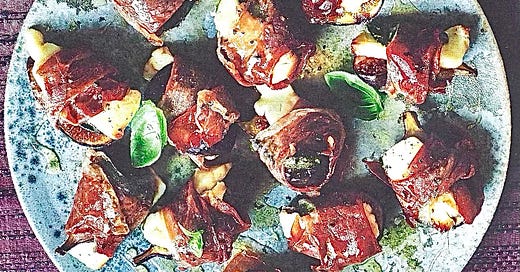Do you listen to recipes? Nigella and Nigel would like you to.
And a fantastically delicious recipe for roasted figs, halloumi, prosciutto and basil ... offered to you in written and spoken form.
Nigel Slater is talking to me about tarts. His mellifluous voice is reassuringly familiar, deep and slow, as he explains that silky custard is delicate and must be incorporated into a pastry case with care. He makes his recipe sound eminently doable and his chat is making me dribble. But hearing him speak in my kitchen is, also, discombobulating. Wait. Nigel’s here?! Of course, he’s not literally beside me in the kitchen. I’m listening to him speak his cook book, A Cook’s Book.
Slater is one of a growing number of cookery writers, some household names, most less well-known, who produce audio cook books alongside the printed and kindle versions of their work. Nigella does it. So does Tom Parker Bowles for his new title, Cooking and the Crown. They dedicate hour after loquacious hour to reading aloud and recording their recipes and other material from their books. From air fryer cooking to baking, you can follow recipes via the spoken, not just the written word, on a wide range of culinary topics. But, weirdly, it’s a category that doesn’t get much publicity.
“This is a pretty new medium for cook books,” a senior publishing figure tells me. “It’s a category in which physical sales definitely dominate, but it’s fair to say it’s a growing area for this genre,” she says. “The additional format brings extra retail visibility, not to mention one more thing authors, agents and publishers can shout about. I think it’s a good thing, for the right books.”
Laura Goodman’s (aka
) wonderful The Joy of Snacks is available in an audio, as well as in printed and kindle format. Shortlisted for the Fortnum & Mason food book of the year 2023, and Guardian books of the year 2022, it’s a rich collection of essays and meditations about snacks, as well as recipes. Goodman was initially given 1.5 days to record the book, for which, like all authors, she received a reader’s fee. “I knew it wouldn’t be enough time, and it wasn’t,” she tells me. “I was absolutely knackered after the full day.” But she thoroughly enjoyed the process. “I was very pregnant, so it wasn’t the most comfy experience, but it was weirdly nice to spend some time with my words.”Her editor, Anna Steadman, says Goodman has such a strong authorial voice she really wanted to harness it in spoken as well as in written form, and the audio version of the book was ideal for this. “She’s so funny and that’s so rare in a cookery writer,” Steadman says. She adds that non-fiction, including cookery titles, works best when the author reads the work themselves; fiction, on the other hand, where there’s an array characters and voices, can work better with an actor reading the words.
In a way, the rise of audio cookbooks squares a circle. At the dawn of British radio broadcasting in the 1920s and 1930s, a group of pioneering cookery writers, mostly women, spoke their recipes to the nation, alongside guidance on how best to use the ingredients that were in season.
These earliest BBC broadcasts were ‘live’ and therefore ephemeral (and very sadly not recorded), requiring listeners to either scribble notes of what they’d heard, or write in to request a copy of a recipe that was mentioned. Programme makers quickly realised there was significantly more interest in cookery broadcasts than they first anticipated. In 1932, a series of talks by Miss Helen Simpson proved “almost embarrassingly popular”, resulting in 16,000 requests for a single recipe, according to the Radio Times. After this, supplementary pamphlets were written up and printed for listeners to buy following a broadcast - a bit like the PDFs that accompany most audio cook books today. But a century on, what drives demand for spoken recipes?
Keep reading with a 7-day free trial
Subscribe to Pen and Spoon to keep reading this post and get 7 days of free access to the full post archives.





